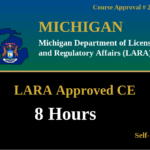
Michigan Builders License vs. Electrical Contractor License
Michigan Builders License vs. Electrical Contractor License: Knowing Your Lane is Key to Your Career
If you’re a skilled trades professional in Michigan, you’re in a great position. With a persistent skilled trades shortage and tens of thousands of job openings projected annually, the demand for your expertise has rarely been higher. As a journeyman electrician or experienced residential electrician, you might be looking at the next step: starting your own business. That’s when a critical question comes up: to grow your business, do you need a Michigan builders license or an electrical contractor license?
You might see ads for a 60-hour pre-licensure course for builders and wonder if that’s your ticket to larger projects and bigger paydays. The answer is complex, as these two licenses are governed by different laws and authorize a completely different scope of work. Choosing the wrong path can lead to wasted time, money, and serious legal trouble. Understanding the sharp legal line between these roles is essential for any electrician planning their future in Michigan’s thriving construction market.
The Big Picture Role: What is a Michigan Residential Builder License?
A Michigan residential builder license authorizes a person or company to enter into contracts for large-scale construction projects. Governed by the Stille-DeRossett-Hale Single State Construction Code Act and the Michigan Occupational Code, this license is for the professional who acts as the general contractor. In general, a person who contracts to perform residential construction or remodeling must be licensed. The law does provide an exemption for projects where the total contract price for labor, materials, and other items is less than $600. A builder manages the entire project, from foundation to finish, coordinating various trades to bring the project to completion.
To get this license, applicants must complete a state-approved 60-hour pre-licensure course covering business management, codes, and liability, and then pass a two-part exam. There is also a more limited license called a maintenance and alteration contractor, which restricts a contractor to specific trades like carpentry, roofing, or concrete, but not electrical or plumbing.
Here is the most critical point for electricians: holding a Michigan residential builder license does NOT permit you to perform electrical work yourself. The law is explicit that a builder must subcontract electrical work (along with plumbing and mechanical) to a separately licensed professional in that trade.
The Specialist Role: Understanding the Michigan Electrical Contractor License
While a builder oversees the entire site, an electrical contractor license is required for the specialized, technical, and highly regulated business of electrical installations. Governed by the Michigan Electrical Administrative Act (Act 217 of 1956), this is the license you need to own and operate a business that performs electrical work. It is the key to legally offering electrical services, hiring electricians, and, crucially, permit pulling for electrical jobs.
The path to becoming an electrical contractor is fundamentally different from that of a builder. It’s built upon a foundation of in-the-field electrical expertise. The hierarchy in the electrical trade is clear:
- Apprentice Electrician: Learns the trade under the supervision of journeymen and masters.
- Journeyman Electrician: A licensed professional who has completed the required hours (typically 8,000 over 4 years) and passed an exam, allowing them to perform electrical work under a master’s supervision.
- Master Electrician: The highest level of electrician licensing. According to state law, this requires having held an electrical journeyman’s license for at least 2 years and obtaining at least 12,000 hours of experience over a period of 6 years or more related to electrical work under the supervision of a master electrician. A master electrician can supervise journeymen and apprentices.
- Electrical Contractor: To obtain an electrical contractor license, a business must either be owned by a licensed master electrician or employ a full-time master electrician who is responsible for all work and code compliance.
This structure ensures that the person legally responsible for a company’s electrical work has achieved the highest level of technical expertise in the trade.
Scope of Work and Penalties: Why You Must Stay in Your Lane
The distinction in scope of work is a bright, uncrossable line drawn by Michigan law to ensure public safety. A builder manages contracts; an electrical contractor performs electrical work. A builder who performs their own wiring, or an electrician who tries to act as a general contractor on a large project without a builder’s license, is breaking the law.
Michigan’s Department of Licensing and Regulatory Affairs (LARA) takes this seriously. Engaging in work outside your license’s scope is treated as unlicensed activity. The license violation penalties can be severe, ranging from fines of a few hundred dollars to over $25,000 for subsequent offenses, and can even include misdemeanor or felony charges, especially if the illegal work leads to injury or death. Conspiring to circumvent these licensing requirements also carries its own set of civil fines.
Choosing Your Career Path: Specialize or Generalize?
For a journeyman electrician or ambitious residential electrician, the path forward depends entirely on your career goals.
Path 1: The Electrical Expert
If you love the electrical trade and want to be the go-to expert for wiring, service, and installation, your focus should be on the electrical licensing ladder. The goal is to become a master electrician and then secure your electrical contractor license. This allows you to build a business dedicated to your specialty, taking on subcontracting jobs from dozens of builders. This path requires ongoing continuing competency and staying on top of code changes. Keeping up with the NEC is non-negotiable; for example, understanding how the code affects service disconnects or labeling requirements is crucial for every job.
- How does the 2023 NEC change dwelling unit load calculations?
- How many service disconnecting means are allowed per service under the 2023 NEC?
- How to comply with 2023 NEC service equipment labeling requirements
Path 2: The Construction Entrepreneur
If your ambition is to manage entire residential projects from the ground up, then pursuing a Michigan residential builder license might be the right move. This shifts your focus from hands-on trade work to project management, bidding, and client relations. However, you will still be legally required to subcontract electrical work to a licensed electrical contractor. For the truly ambitious, holding both licenses is possible, allowing you to act as the general contractor while also having your own licensed electrical company perform the wiring. This provides maximum control but also doubles the licensing, insurance, and administrative burden.
Ultimately, whether you are advancing as an electrical professional or branching out, ongoing education is critical. Staying current with codes and best practices is essential for compliance and success. Browse our courses to find state-approved online electrical courses designed to help you meet your professional goals and continuing competency requirements.
Frequently Asked Questions
Can a licensed Residential Builder pull electrical permits in Michigan?
No. According to LARA, only a licensed electrical contractor can apply for and obtain electrical permits. A builder pulls the building permit, but the electrical, plumbing, and mechanical permits must be pulled by contractors licensed in those specific trades.
Do I need to go to an electrician school to get a Michigan builders license?
No. The educational paths are separate. A builder’s license requires a 60-hour pre-licensure course focused on construction management, law, and codes. An electrician’s career path typically starts with an apprenticeship or electrician school program to gain the thousands of hours of experience needed for a journeyman license.
Michigan Continuing Education Courses
Explore our board-approved continuing education courses for Michigan professionals:
View CE RequirementsMichigan – 15 hours NEC 2023 Code Changes Update
Michigan – 8 hours NEC 2023 Changes for Sign Specialist
Disclaimer: The information provided in this educational content has been prepared with care to reflect current regulatory requirements for continuing education. However, licensing rules and regulations can vary by state and are subject to change. While we strive for accuracy, ExpertCE cannot guarantee that all details are complete or up to date at the time of reading. For the most current and authoritative information, always refer directly to your state’s official licensing board or regulatory agency.





